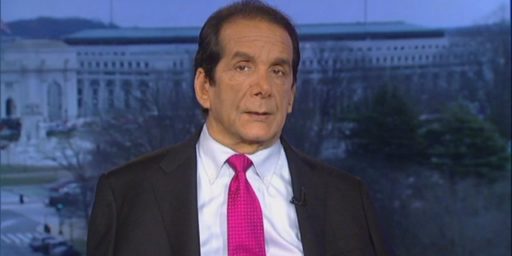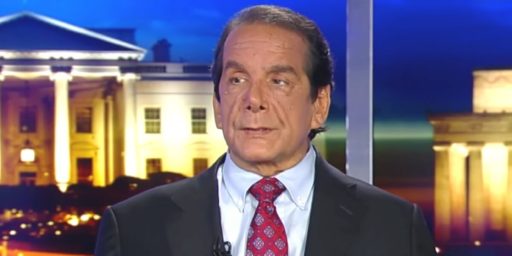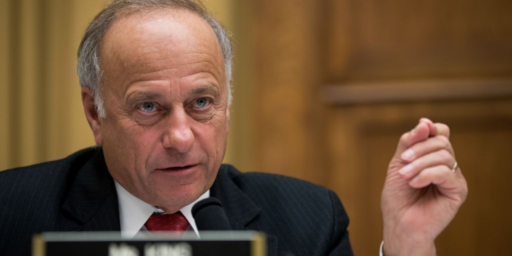Charles and his King (or the Odd Musings of Krauthammer on the Presidential Nomination Process)
Cross-posted from PoliBlog:
Charles Krauthammer has a column in today’s WaPo in praise of what has become a two-year+ campaign for president: Two Years of Humble Pie.
He starts the piece with a dig at parliamentary systems wherein snap elections can be called and campaigns are brief. But mostly he moves into the typical argument in favor of the long campaign, such as the fact that a long campaign requires managerial and organizational skills. Maybe–but they aren’t necessarily the same kinds of skills needed for governing.
He also makes this claim:
The presidential primary season is essentially a prolonged intraparty dialogue. It re-creates the Madisonian idea of factions and interests competing against each other, applied not to the legislature or the executive but to the electoral process that produces both. The job of the parties is to create a kind of pre-legislative consensus through the competition and conversation of the various factions — ethnic, ideological, economic, geographic. The purpose of the endless presidential primary is to force the dialogue and, for all its haphazard meanderings and maddening trivialities, it does.
I think this sounds good in theory, but I am not so convinced that this is, in fact, the case in practice. What pre-legislative consensus did either of the last two Presidents create within their own parties, even as both entered office with unified government? I suppose one could argue that Bush came into office with tax cuts as an issue that he held in common with the Republican congress, but any GOP president would have done that–it certainly wasn’t the result of elegant Madisonian mechanisms that emerged during the primary process.
Indeed, one could argue that the separation of powers system that is in place makes it highly unlikely that the campaign would generate a workable legislative agenda that could be implemented smoothly. Yes, presidents enter office with a vaunted “honeymoon” period and frequently argue that they have a “mandate” but how much of that is generated by the fact they just won a very powerful office rather than being some sort of organic result of a two-year nomination process that infused his party?
And what if a president comes to office with divided government (i.e., with one or both chambers of the Congress in the hands of the opposition)? Where is the “pre-legislative consensus” then?
Sure, the party coalesces around one candidate each at the end of the day, but that is a necessity facilitated by the fact that there is just one candidacy per party. Republicans and Democrats would rally around their candidates if the campaign was six weeks, six months or six years in length.
The weirdest part of the column is the conclusion (which links back to the title of the column):
The final function of the endless campaign, and perhaps the most psychologically important, is to satisfy the American instinct for egalitarianism. We have turned the presidential campaign into a pleasingly degrading ordeal — pleasing, that is, to the electorate. The modern presidential campaign is meant to be physically exhausting and spiritually humbling almost to the point of humiliation. Candidates spend two years and more on bended knee begging for money, votes and handshakes in a diner.
Why do we inflict such cruel and unusual punishment? Because our winner is not just chief magistrate but king. True, the kingship is temporary, but its glories and perks are beyond compare — the pomp and pampering of a head of state, married to the real political power of controlling the most important state on the planet.
The bargain we offer the candidate is this: We will make you Lord, circling celestially above us on Air Force One, but because we are flinty Jeffersonian yeomen, we insist that you flatter us first with a very extended show of camaraderie and commonality with the Iowa farmer, the New Hampshire alderman and the South Carolina good ol’ boy. Aboriginal tribes have slightly different rituals for those who pretend to kingship, but the idea is the same: ordeal before dominion.
As a columnist whose job it is to chart every jot and tittle of these campaigns, every teapot tempest that history will remember for not one second, I curse election years. Now I have to curse the year before as well. But for all its bizarre meanderings, the endless campaign serves critical purposes.
The first two — testing the candidates’ managerial and consensus-building skills — are undeniably useful. But like most Americans, I find it is the third — the gratuitous humiliation of our would-be kings — that makes it all worthwhile.
Several thoughts come to mind. First, I suppose I should give Krauthammer the benefit of the doubt for trying to wax poetic here, but “king” and “Lord”? Yes, the President of the United States is a powerful office and there is much pomp and circumstance to be associated with the position, but I have never in my life, even metaphorically, thought of the President as an elected “King” and certainly have never applied the title “Lord” in the direction of the White House.
Beyond that, Krauthammer is buying into what I criticized just yesterday: the romantic notion that “a very extended show of camaraderie and commonality with the Iowa farmer, the New Hampshire alderman and the South Carolina good ol’ boy” is somehow a good measure of presidential mettle. Because, Goodness knows that the job is made up of such encounters. I have never grasped why two years of forced bonhomie makes one qualified for the presidency.
And this notion that the president should be viewed as a elected king is simply troubling–even if all that Krauthammer is talking about is the symbolic nature of the job and the fact that the president is separated on a daily basis from the “common people.”






If the two-year campaign is going to follow the pattern of the last GOP debate — where candidates tell amazing lies, and the reporters discuss haircuts and shoulder-breadth — then let’s forget the campaign AND the election, and just draw straws.
OK, this guy just pisses me off.
Krauthammer is a complete and utter moron. Exactly what planet has he been living on the past 7 years? The ‘endless campaign’ has exactly _nothing_ to do with egalitarianism or making our candidates look human – candidates have been kissing hands & shaking babies since before TV was invented, Charles. The purposes behind never coming out of campaign mode are: a) to raise the bar for entering the race to cover only people with the money, connections, free time, and enfettered ego to spend _years_ blowing their own horns, b) to give enough time to do oppo research and grind down any contenders, and c) to reduce all policy decisions to mere PR – it doesn’t matter if you never address any actual _problems_ so long as your PR folk can spin it as good (or unashamedly lie about the event) until the next news cycle.
Steven, you are completely correct – PR is not governing. Sadly, few Americans – and _no_ members of the media – seem to grasp that anymore.
Didn’t we fight a war back in 1775 about this whole King business?
Dr. Taylor,
Krauthammer makes some good points but I think you and others are making too much of a big deal out of his column. His musings are interesting but still musings on the modern political scene. For this he’s labeled a “complete and utter moron”? Somebody needs a reality check.
The imagery of president as king is as good of an example as any so we should accept it as it was written, as imagery. The idea that policy is refined during long campaigns seems correct as well as the idea that candidates must humble themselves before the electorate. For senators especially this sounds like a good thing.
The disagreement between Krauthammer and you concerning the Iowa, New Hampshire, South Carolina spectacles seems more along the lines of one seeing and pointing out the bad points and one seeing and pointing out the good points.
I don’t see much controversy here.
Several objections, right off; in Britain Canada and other civilized places, he is quite correct that elections are concluded within six weeks from the time they are called. However , that set up also leads to a great deal more political posturing and a great deal more in the way of governmental largess to buy votes with, at the next opportunity, whatever and whenever that might be. In effect, instead of a relatively concentrated among time wherein people are running for election to a specific office, politicians are posturing all the time, snf udsing governmental largess to do it, in large part. I’m not sure this can be considered a good thing.
It’s true enough, that the US Democrats have been doing this for some time now. So perhaps the line isn’t as undefined as either of us make it. Still, I have objections to calling the systems of Britain and Canada a respite from the nonsense that Krauthammer decries here.
As for the wisdom he invokes as regards revealing a certain level of competency, I submit two examples to the contrary; Jimmy Carter, and Bubba Clinton.
Except that it’s not, Steve. It’s an op-ed in a major paper not a think-piece in an obscure poli-sci journal – it’s meant to influence public thought and perception. Specifically, that ‘imagery’ is meant to legitimize the concept of an imperial presidency & make it acceptable to the public sensitivity. That is intolerable, and it’s one reason for my invective.
Also, bithead, you’re right about the posturing and largess in multi-party/parlimentary gov’ts. It’s got it’s flaws, but that’s how coalitions are built in such a complex environment – you can’t get away with just playing to one or two ‘base’ voter sets & expect to squeak through the general election on undecideds & people who decide not to vote.
Besides, wouldn’t increasing campaign time (or even maintaining the already ridiculous length) simply make that problem in the US worse?
Dude, do you even know who Karl Rove is?
I see a lot of complaining going on, but not one person has offered a viable solution. I don’t see any purpose in just sitting around having a bitch-o-rama.
Personally, I see absolutely nothing wrong with continuous campaigning, 365 days a year, year in and year out. Hell, it’s no different than selling Coke or Pepsi.
sure. I just don’t give them credit for having invented it. Moreover I don’t give me credit for having engaged in it nearly as much as the democrats have for the last 40 stinking years.